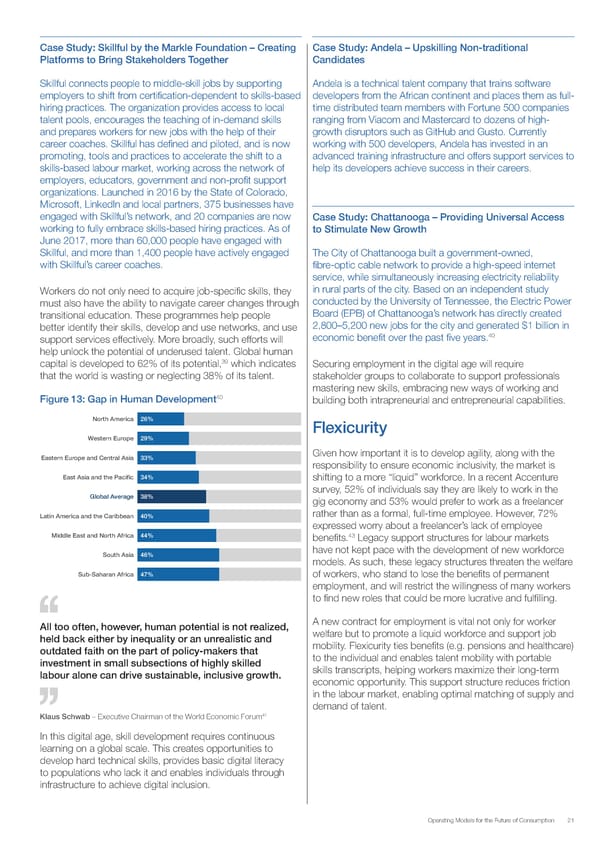Case Study: Skillful by the Markle Foundation – Creating Case Study: Andela – Upskilling Non-traditional Platforms to Bring Stakeholders Together Candidates Skillful connects people to middle-skill jobs by supporting Andela is a technical talent company that trains software employers to shift from certification-dependent to skills-based developers from the African continent and places them as full- hiring practices. The organization provides access to local time distributed team members with Fortune 500 companies talent pools, encourages the teaching of in-demand skills ranging from Viacom and Mastercard to dozens of high- and prepares workers for new jobs with the help of their growth disruptors such as GitHub and Gusto. Currently career coaches. Skillful has defined and piloted, and is now working with 500 developers, Andela has invested in an promoting, tools and practices to accelerate the shift to a advanced training infrastructure and offers support services to skills-based labour market, working across the network of help its developers achieve success in their careers. employers, educators, government and non-profit support organizations. Launched in 2016 by the State of Colorado, Microsoft, LinkedIn and local partners, 375 businesses have engaged with Skillful’s network, and 20 companies are now Case Study: Chattanooga – Providing Universal Access working to fully embrace skills-based hiring practices. As of to Stimulate New Growth June 2017, more than 60,000 people have engaged with Skillful, and more than 1,400 people have actively engaged The City of Chattanooga built a government-owned, with Skillful’s career coaches. fibre-optic cable network to provide a high-speed internet service, while simultaneously increasing electricity reliability Workers do not only need to acquire job-specific skills, they in rural parts of the city. Based on an independent study must also have the ability to navigate career changes through conducted by the University of Tennessee, the Electric Power transitional education. These programmes help people Board (EPB) of Chattanooga’s network has directly created better identify their skills, develop and use networks, and use 2,800–5,200 new jobs for the city and generated $1 billion in 40 support services effectively. More broadly, such efforts will economic benefit over the past five years. help unlock the potential of underused talent. Global human 39 capital is developed to 62% of its potential, which indicates Securing employment in the digital age will require that the world is wasting or neglecting 38% of its talent. stakeholder groups to collaborate to support professionals mastering new skills, embracing new ways of working and 40 Figure 13: Gap in Human Development building both intrapreneurial and entrepreneurial capabilities. North America 26% Flexicurity Western Europe 29% Eastern Europe and Central Asia 33% Given how important it is to develop agility, along with the responsibility to ensure economic inclusivity, the market is East Asia and the Pacific 34% shifting to a more “liquid” workforce. In a recent Accenture survey, 52% of individuals say they are likely to work in the Global Average 38% gig economy and 53% would prefer to work as a freelancer Latin America and the Caribbean 40% rather than as a formal, full-time employee. However, 72% expressed worry about a freelancer’s lack of employee Middle East and North Africa 44% 43 benefits. Legacy support structures for labour markets South Asia 46% have not kept pace with the development of new workforce models. As such, these legacy structures threaten the welfare Sub-Saharan Africa 47% of workers, who stand to lose the benefits of permanent employment, and will restrict the willingness of many workers to find new roles that could be more lucrative and fulfilling. All too often, however, human potential is not realized, A new contract for employment is vital not only for worker held back either by inequality or an unrealistic and welfare but to promote a liquid workforce and support job outdated faith on the part of policy-makers that mobility. Flexicurity ties benefits (e.g. pensions and healthcare) investment in small subsections of highly skilled to the individual and enables talent mobility with portable labour alone can drive sustainable, inclusive growth. skills transcripts, helping workers maximize their long-term economic opportunity. This support structure reduces friction in the labour market, enabling optimal matching of supply and demand of talent. 41 Klaus Schwab – Executive Chairman of the World Economic Forum In this digital age, skill development requires continuous learning on a global scale. This creates opportunities to develop hard technical skills, provides basic digital literacy to populations who lack it and enables individuals through infrastructure to achieve digital inclusion. Operating Models for the Future of Consumption 21
 Operating Models for the Future of Consumption Page 20 Page 22
Operating Models for the Future of Consumption Page 20 Page 22